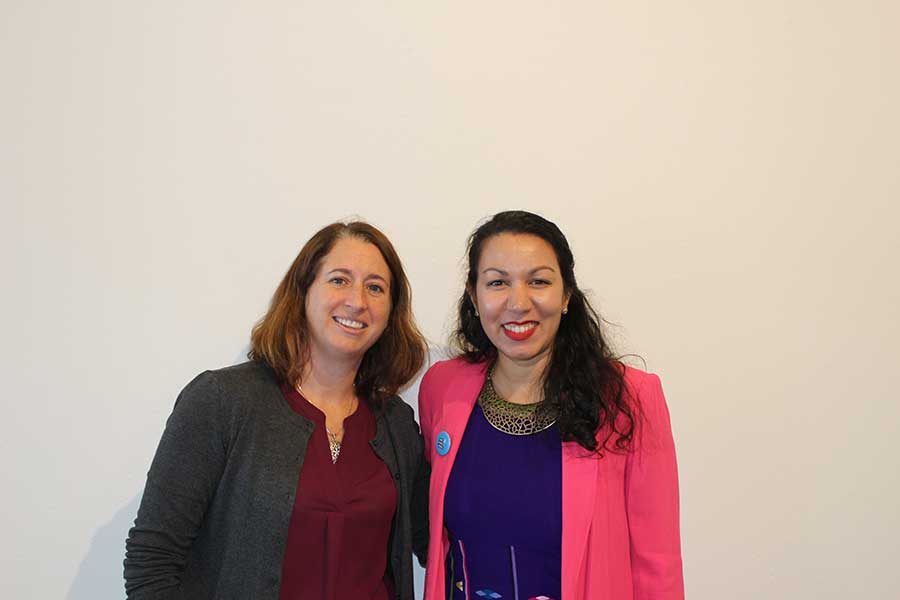Kesha Ram: get involved!
Kathlelen Brinegar and Kesha Ram
On Jan. 22, students, staff and faculty were invited to Dibden Center for the Arts to hear a keynote speech from former Vermont legislator Kesha Ram. Ram spoke for the Martin Luther King Day and Diversity Day celebrations, albeit a day late.
Even though the event was postponed to accommodate both the snowstorm and late student move-ins, the crowd was sparse.
Her opener, a few broad questions, was met with mostly disinterest and blank stares, after which she asked the crowd for their experiences in the celebration of Martin Luther King day. When no one spoke up, Ram said, “I’m gonna start calling on people.”
According to a press release from NVU in December, Ram was initially supposed to present her thoughts and takeaways on “57 Bus” by Dashka Slater, this year’s Common Book. However, the content of her presentation wandered around a point for upwards of forty minutes.
Her mentions of Martin Luther King focused on the less-publicized version of the late civil rights leader. She talked about his years after the “I Have a Dream” speech, after King had, according to Ram, become “a little more radicalized and more frustrated with the pace of progress.”
“Storytelling matters,” Ram said. “It’s important we have a holiday dedicated to somebody so that we can dig deep into that history and not look away.”
While Ram’s rambling presentation included a story of the founding of her own Diversity and Inclusion Task Force at the University of Vermont and the fear of exploring systemic racism in Vermont and New England, the bulk of the presentation focused on less local events and more on racially charged events in the world at large.
Ram spent most of her talk on two news events, one from 1994 and one from just days beforehand. In 1994, a group of students in Oakland had gained national attention for goofing off in a cinema showing “Schindler’s List.” They were vilified in the press, prompting a visit from “Schindler’s List” director Steven Spielberg, who openly forgave the kids and asked that they be left alone. Ram also mentioned the recent national incident between a Native American man and some students wearing “Make America Great Again” hats.
In both instances, the students were vilified and portrayed as one-dimensional and antagonistic. Once again, Ram asked the audience a few questions, this time asking for their thoughts on the video of the Native American man and the “MAGA” students. There was uncomfortable, awkward silence until some members spoke up.
At nearly 20 minutes into her talk, Ram finally addressed the Common Book, for a total of about 20 seconds. She related the struggles of the characters in “57 Bus” to those of the students in “MAGA” hats or the ones years ago in Oakland.
Ram spoke about Kentucky, where the students in “MAGA” hats are from, and then spoke about the political system in Myanmar, a country in Southeast Asia.
Ram concluded by speaking about how she ended up in politics. In 2006, a “certain senator from Illinois” [Barack Obama] encouraged Ram to run for the Vermont Senate. Even though she was from LA, Ram said, “they looked at me and said, ‘Okay, let me understand this. You’re from Los Angeles, and you want to stay in Vermont. You’re already here, that’s hard for us to understand, but now you want to stay here and run for office? You sound crazy enough to be a Vermonter. I think we will elect you!’”
This, in a quite roundabout way, was the settling point of Ram’s address. The last 15 minutes of the almost-hour-long speech focused on the idea that no matter who you are, you are qualified to run in your local elections. “Believe me,” she said, “when you’re 21 and knocking on doors you don’t feel very qualified.What matters is that you do a lot of listening in those moments.” Even when someone in a comment section called her a “kitten with lipstick,” Ram said “In spite of all that was happening, I just kept knocking on doors and talking to people. Lo and behold in 2008 that same person that encouraged me to run for office in 2006 became the 44th President of the United States and I became the youngest legislator in the country. That is the power I am trying to communicate to all of you.”
Although Ram veered from discussing the Common Book, her address still held the same important tenets that Martin Luther King Day is supposed to embody: diversity, inclusion, and celebration of the two.

Senior, Journalism & Creative Writing
Grew up in Atkinson, NH
Fall 2018
Along with traditional journalism, I enjoy writing satire and fun feature...




